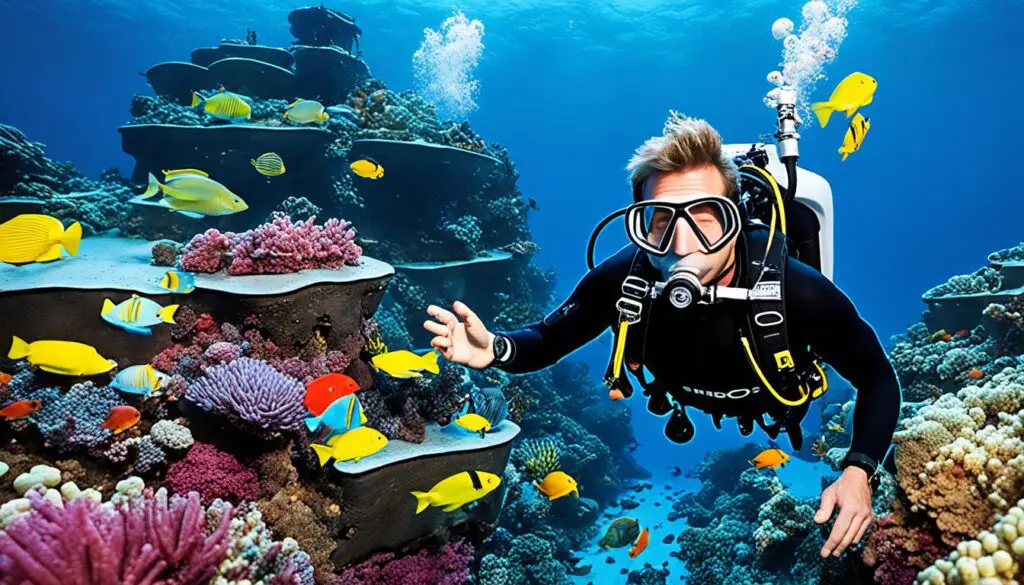Having the right gear is vital for a safe and fun dive. If you’re new to diving, investing in quality gear is key. This ensures it meets your diving requirements.
Choosing the right wetsuit or dry suit is important. While a 7mm wetsuit works in warm water, it’s not enough in the cold. A dry suit lets you dive all year, even when it’s chilly. Yes, it costs and needs extra training, but it’s a must for serious divers.
Good diving gear isn’t just about suits. Masks, fins, and regulators are crucial. Always pick gear that ensures safety, fits right, and works well. Doing so makes diving better, letting you enjoy every dive more.
Key Takeaways:
- Invest in a dry suit for diving in colder water temperatures
- Ensure your diving gear fits properly and functions well
- Consider additional certification courses to expand your diving capabilities
- Prioritize safety by investing in quality gear
- Choose gear that suits your diving needs and preferences
Essential Skills for Safe Diving
When diving, safety is top priority. Learning key skills enhances your experience and cuts risks. Knowing dive conditions and proper gear care let you dive with confidence and responsibility.
Dive Conditions and Assessment
Before diving, check the conditions. Look at wind, visibility, currents, and water temp. This knowledge helps divers decide if it’s safe and suitable. Talk to experts for the latest advice.
The Buddy System: Your Lifeline Underwater
The buddy system is crucial in diving. A dive buddy means safety and fun. Plan with your buddy before diving. Use buddy checks and BWRAF to ensure gear works and support each other.
Gear Maintenance for Reliable Performance
Keep your diving gear in top shape for safety and better dives. Take care of your mask and regulator. Check and service gear often to avoid problems. Remember, good gear is trustworthy.
Mastering Buoyancy Control
Buoyancy control is key for easy diving. It lets you stay at the right depth and move well. Finding neutral buoyancy, adjust weight properly. Practice to improve and protect ocean life.

Learning these skills makes diving safe and fun. Stay within your limits and keep learning. Improve your diving with more training and practice.
Dive Safety Tips for New Divers
Keeping safe in diving is a must. Make sure you are fit and ready before diving. Exercising and staying healthy, sleeping well, and drinking enough water are key. They help you dive safely and enjoy it more.
Knowing about emergency help is crucial. Learn where you can find oxygen, first aid kits, and the nearest hospital. It’s also important to know who to call for help. This knowledge will make you feel calm while diving.
Having the right insurance for diving is also essential. Check that your dive and travel insurance cover scuba diving. This will help protect your money if anything goes wrong.
Diving with a buddy is safer than alone. Before each dive, check your gear with your buddy. Make sure everything works well. Remember to equalize often and watch your dive gauges. And always ascend slowly to avoid getting sick from decompression.
Speaking up if something is wrong is crucial. Tell your dive buddy or guide if you don’t feel well or spot a problem. By keeping an eye on your health and talking about issues, you can avoid accidents. This helps you have a fun and safe dive.
FAQ
What are some important diving ratings to consider?
To dive safely, you must have the right certifications. For different types of dives, you’ll need levels like Open Water Diver or Advanced Open Water Diver. These certifications prove you know how to dive well and stay safe.
What gear do I need for diving?
You will need a lot of gear for diving including a mask, snorkel, and fins. Also, you need a wetsuit or drysuit, a BCD, and regulator. It’s vital to buy good quality gear that fits you well and that you can take care of.
Where are some popular diving sites?
Some top places for diving include the Great Barrier Reef, Maldives, and the Galapagos Islands. You can also dive in the Red Sea and Mexico’s cenotes. These places have amazing sea life and beautiful sights underwater.
What kind of training is required for diving?
To dive, you must finish a certification course from places like PADI or SSI. The course has class work, pool sessions, and dives in the ocean. This training is to make sure you can dive safely and well.
How should I assess dive conditions?
Checking dive conditions is very important before going underwater. Look at the wind, how clear the water is, and the temperature. Talk to local experts or check online to get the latest on your dive site’s conditions.
Why is the buddy system important in diving?
Having a dive buddy is key in diving for safety and fun. Buddies help each other check equipment and handle any issues. Diving with a buddy means you’re safer and have someone to share the dive experience with.
How should I maintain my diving gear?
Taking good care of your gear is essential for safe diving. After each dive, rinse it with fresh water and store it in a dry place. Check for damage often and have it serviced by a professional. This care means your gear will work well for a long time.
How can I control my buoyancy while diving?
Learning to control your buoyancy is key to diving well. It means you can stay at the right depth in the water. You control this by how much weight you use, adjusting your BCD, and your body’s position. With practice, you can get really good at this.
